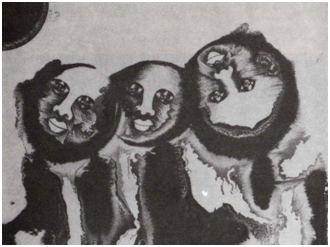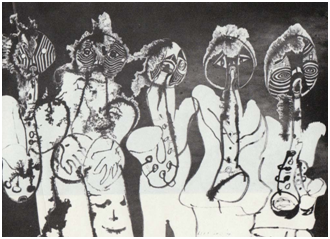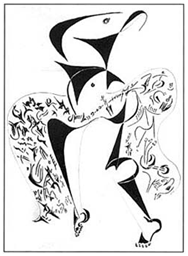Abstract: This paper focuses on the life on Lefifi Tladi. Tladi is an artist, poet, and jazz singer that went into exile in South Africa because of apartheid. This is the biographical portion of the paper. At the end of the paper there is a short exhibit of his work.
Key Words: Lefifi Tladi, Exile, Poetry, Art
Lefifi Tladi: Biography & Exhibit
Lefifi Tladi was born at Lady Selborne, Pretoria in 1949[i] . Tladi is an artist, poet, and jazz singer. Most of Lefifi Tladi’s artwork was created in Sweden because this is where Tladi was in exile[ii] . In Sweden, Tladi apprenticed under Harvey Cropper, who is a well-known painter who taught another jazz artist, Charlie Parker, how to paint[iii] . Tladi received a scholarship to enter Cropper’s studio in 1980[iv] . Lefifi Tladi’s style is described as modernist and African.
Tladi uses a plethora of disciplines for his artwork. These include calligraphy, drawing, and oil paintings[v] . Tladi creates his art for educational reasons. Tladi says “observing how the intensity of the sun creates shadows and light in Africa compared with Europe”[vi]. The artwork he creates is made for educational reasons. He wanted Africans to learn about their own history and culture: “We thought this kind of material that could be used for education, especially in the arts. Instead of studying Picasso Matisse and all these people, it’s about time we studied ourselves”[vii] . He wants the children of South Africa to grow up learning about South African art because it makes them conscious of their surroundings. Art is a very complicated skill and, according to Tladi, senses are the most important part to being a successful artist. In an interview with Karibu, Tladi says, “To be a good artist, you must have a broader sense of perception which means it is very important to train all of your senses, because what you produce as an artist is what you perceive in the world. Need to develop sound consciousness”[viii] . The way you perceive the world is shaped by the way you grow up, which made it difficult for South Africans to create art. Tladi says that art suffered during the time of apartheid because it was hard for students to see beyond their townships for inspiration[ix] . On that topic, he says “That’s why we have never had a South African art; we always had township art…We couldn’t perceive ourselves beyond the township in the context of South Africa. That’s what the limitations were”[x] .
Tladi also uses poetry to enlighten the people of South Africa. He says, “The advantage with us was that before we became poets we were actually reciters”[xi] . He also says that he remembers reading poetry and memorizing them so that he would be able to recite them anytime that he wanted to[xii] . Tladi says this was key to his success as a poet. Tladi also describes issues relating to poetry and the history of South Africa, “This is problematic, because it’s caused by the fact that we don’t know our history. You ask these young musicians at these academies: Can you give me at least five South African top trumpet players? It ends with Hugh [Masakela] ”[xiii] . Lefifi Tladi sheds light on the fact that because the pre-colonial history of South Africa was ignored in schools during colonialism and apartheid apartheid many people do not know South African history. In the same interview with Karibu, Tladi says that poets these days do not have a consciousness for what they are writing about, that when he was starting out as a poet they had an African consciousness[xiv] . Tladi uses his poetry as a teaching tool, he says “You can take a horse to the river and make it drink… My motto is to teach the horse first, and he will find the pond”[xv] .
Lefifi Tladi’s African art and poetry reveals his Black Consciousness outlook, but he never joined a political party. South African History Online talks about the meaning of Black Consciousness; Which is, consciousness of what being black means in that society, and therefore also a consciousness of self, of identity[xvi] . Poetry is used as a tool for Black Consciousness, SAHO says, “Black Consciousness poets drew from cultural traditions to discuss, criticize and express the oppression of the present”[xvii] . Tladi talks about how this has become a problem with the poets in South Africa today; They do not have the right consciousness[xviii] . It seems as if Tladi paved the way for South Africans and utilizing poetry as a tool for Black Consciousness. He leaves in 1976, but SAHO says, “After 1976, the youth and student movements began to systematically incorporate oral poetry into their activities. Poetry became strongly tied to the labor movement of the late 1970s as izibongo-like performances were included at trade-union rallies, political meetings and funerals in affirmation of solidarity”[xix] . He participated in some of the events that were set up by parties, but did not want to be a member. Tladi says: “I’ve always refused to join the party… I’ve always thought artists must not belong to political parties”[xx] . He also specifies that he was willing to participate, but not join, when he says: “I made it clear that I would be more than available to participate if the party had any programmes that were beneficial to our people and [to] move our struggle; but not to join”[xxi] .
And yet, Tladi’s student politics led him to arrest and exile. When Tladi was arrested in 1976, he fled to Botswana and in 1980 he moved to Stockholm, Sweden to study art[xxii] . Tladi and his group of followers heard about the uprising of the students in Soweto in 1976. After hearing of these uprisings, Tladi form his own group of students to march against apartheid. They began destroying all of the symbols of apartheid and ultimately the South African Police arrested one student, who pointed out all of the people who were involved in the uprising[xxiii] . Upon being arrested, Tladi’s lawyer told him that the government upgraded their charges from public violence and arson to sabotage, which is the maximum charge that could be given[xxiv] . His lawyer proceeded to tell him that he could either spend 18 years on Robben Island, or leave the country[xxv] .
Tladi and his co-accused elected to go into exile rather than prison. They left and went to Zeerust and then literally walked across the border to Botswana. The Front Line States (FLS) was formed in Botswana in 1974[xxvi] . The African National Congress (ANC) used this as well as other groups to help establish a liberation movement throughout. All of the groups created were for exile missions. Botswana was a particularly smart choice for Tladi because Botswana was one of the few countries that did not have any armed dissidents[xxvii] . Tladi left in 1976, which was before South Africa starts to show interest in intervening in Botswana[xxviii] . This becomes a fear beginning in the 1980s, which is when Tladi left Botswana to study in Stockholm, Sweden.
Once they were in Botswana, they went straight to the police station to begin the process to get verified. The reason why they want to be verified is because once they are verified they get a monthly payment from the government. Tladi also talks about the emotions he feels while in exile. “Actually to be very honest it was a great feeling because now you were in a space where you could achieve these dreams of coming back and fighting back for your country, where you can be in a position to arm yourself in any field that could help your country. It wasn’t really depressing feeling because now you are in a position to arm yourself as effectively as possible”[xxix] . When asked about if he missed his family, he said he did but he also said, “There were communications all of the time with home base. We always knew what was going on. Sometimes people would even come visit us… We had real contact with people at home”[xxx] . From all of this information it appears that Tladi was making the best of being in exile. He was now allowed to think for himself, set up meetings with his brothers, have a job, etc.
Lefifi Tladi went through a lot in his life, and he uses his experiences to try and teach the next generation of South Africa. This is important because apartheid skewed the history of South Africa to such an extent that it is difficult for people to find out the truth in the history. People need to do the same things that Tladi is doing: educating the young through past experiences. History is made through experiences, and Tladi has had a lifetime full of experiences, both good and bad. Tladi also provides his take on post-apartheid South Africa relating to the arts, “And you know, it appears the arts enjoyed more [racial] diversity and integration during the dark apartheid years than is the case now”[xxxi] . The key to the success of poetry, in Tladi’s opinion, is to have the correct consciousness. Tladi hosts classes at “his place”. He thinks it is very important for the young people of Africa to learn about South African history so that they are able to have the correct consciousness when they are writing their poetry.
Lefifi Tladi performs poetry to this day, and all of his poems describe the years of apartheid. He is more equipped to show his emotions through poetry, rather than writing or talking.
Lefifi Tladi Online Exhibition:
Lefifi Tladi poetry performance at Pan African Space Station, April 2016:
This is about a 45-minute-long video of Lefifi Tladi reciting poetry at the Chimurenga Pan African Space Station with music by Tumi Mogorosi and Sibusile Xaba. He dedicates his poems to various artists.
Lefifi Tladi poetry performance at Poetry Africa, Durban, 2006
Lefifi Tladi interview on Karibu, January, 2016
Lefifi Tladi artwork:
 Figure 1: Image source
Figure 1: Image source
 Figure 2: Image source
Figure 2: Image source
 Figure 3, 1993: Image source
Figure 3, 1993: Image source
End Notes
[i] Sowetan Live. 2007. Lefifi Tladi, poet extraordinaire, an inspiration. [ONLINE] Available at: http://www.sowetanlive.co.za/sowetan/archive/2007/10/05/lefifi-tladi-poet-extraordinaire-an-inspiration. [Accessed 30 October 2016]. ↵
[ii] News 24. 2011. The Scent of Freedom. [ONLINE] Available at: http://www.news24.com/Archives/City-Press/The-scent-of-freedom-20150430. [Accessed 30 October 2016]. ↵
[iii] Chronic. 2014. Propaganda and Politics tunnel vision history of art activism in South Africa. [ONLINE] Available at: http://chimurengachronic.co.za/propaganda-politics-art-activism-south-africa/. [Accessed 30 October 2016]. ↵
[iv] Ibid. ↵
[v] Ibid. ↵
[vi] News24. The Scent of Freedom. ↵
[vii] Pather, R, 2016. Lifetime's struggle gathers dust. Mail & Guardian, [Online]. Available at: http://mg.co.za/article/2016-04-22-lifetimes-struggle-gathers-dust [Accessed 30 October 2016]. ↵
[viii] Kaya FM 95.9. (2016). Lefifi Tladi on Karibu. [Online Video]. 25 January 2016. Available from: http://www.kayafm.co.za/lefifi-tladi-on-karibu/. [Accessed: 30 October 2016]. ↵
[ix] Pather, R, 2016. Lifetime’s struggle gathers dust. ↵
[x] Ibid. ↵
[xi] Ibid. ↵
[xii] Ibid. ↵
[xiii] Ibid. ↵
[xiv] Kaya FM 95.9. Lefifi Tladi on Karibu. ↵
[xv] Ibid. ↵
[xvi] South African History Online. 2012. Black Consciousness: Cultural Expression and Representation. [ONLINE] Available at: http://www.sahistory.org.za/topic/black-consciousness-cultural-expression-and-representation. [Accessed 1 December 2016]. ↵
[xvii] Ibid. ↵
[xviii] Kaya FM 95.9. Lefifi Tladi on Karibu. ↵
[xix] South African History Online. Black Consciousness: Cultural Expression and Representation ↵
[xx] Chronic. Propaganda and Politics. ↵
[xxi] Ibid. ↵
[xxii] Sowetan Live. Lefifi Tladi, poet extraordinaire, an inspiration. ↵
[xxiii] Kaya FM 95.9. Lefifi Tladi on Karibu. ↵
[xxiv] Ibid. ↵
[xxv] Ibid. ↵
[xxvi] Pfister, R, 2003. Gateway to International Victory: The Diplomacy of the African National Congress in Africa, 1960-1994. Modern African Studies, [Online]. 41/1, 57. Available at: http://www.jstor.org.proxy.libraries.smu.edu/stable/3876189?seq=7#page_scan_tab_contents [Accessed 6 December 2016]. ↵
[xxvii] Dale, R, 1987. Not Always so Placid a Place: Botswana under Attack. African Affairs, [Online]. 86/342, 73. Available at: http://www.jstor.org.proxy.libraries.smu.edu/stable/722867?seq=1#page_scan_tab_contents [Accessed 6 December 2016]. ↵
[xxviii] Ibid. ↵
[xxix] Kaya FM 95.9. Lefifi Tladi on Karibu. ↵
[xxx] Ibid. ↵
[xxxi] Chronic. Propaganda and Politics. ↵
Bibliography:
Chronic. 2014. Propaganda and Politics tunnel vision history of art activism in South Africa. [ONLINE] Available at: <a href="http://chimurengachronic.co.za/propaganda-politics-art-activism-south-africa/." target="_blank">http://chimurengachronic.co.za/propaganda-politics-art-activism-south-africa/.</a> [Accessed 30 October 2016].
Dale, R, 1987. Not Always so Placid a Place: Botswana under Attack. African Affairs, [Online]. 86/342, 73-91. Available at: <a href="http://www.jstor.org.proxy.libraries.smu.edu/stable/722867?seq=1#page_scan_tab_contents " target="_blank">http://www.jstor.org.proxy.libraries.smu.edu/stable/722867?seq=1#page_scan_tab_contents </a>[Accessed 6 December 2016].
Kaya FM 95.9. (2016). Lefifi Tladi on Karibu. [Online Video]. 25 January 2016. Available from: <a href="http://www.kayafm.co.za/lefifi-tladi-on-karibu/. " target="_blank">http://www.kayafm.co.za/lefifi-tladi-on-karibu/. </a>[Accessed: 30 October 2016].
News 24. 2011. The Scent of Freedom. [ONLINE] Available at: <a href="http://www.news24.com/Archives/City-Press/The-scent-of-freedom-20150430." target="_blank">http://www.news24.com/Archives/City-Press/The-scent-of-freedom-20150430.</a> [Accessed 30 October 2016].
Pather, R, 2016. Lifetime's struggle gathers dust. Mail & Guardian, [Online]. Available at: <a href="http://mg.co.za/article/2016-04-22-lifetimes-struggle-gathers-dust" target="_blank">http://mg.co.za/article/2016-04-22-lifetimes-struggle-gathers-dust</a> [Accessed 30 October 2016].
Pfister, R, 2003. Gateway to International Victory: The Diplomacy of the African National Congress in Africa, 1960-1994. Modern African Studies, [Online]. 41/1, 51-73. Available at: <a href="http://www.jstor.org.proxy.libraries.smu.edu/stable/3876189?seq=7#page_scan_tab_contents " target="_blank">www.biznews.com</a>[Accessed 6 December 2016].
South African History Online. 2012. Black Consciousness: Cultural Expression and Representation. [ONLINE] Available at: <a href="http://www.sahistory.org.za/topic/black-consciousness-cultural-expression-and-representation." target="_blank">http://www.sahistory.org.za/topic/black-consciousness-cultural-expression-and-representation.</a> [Accessed 1 December 2016].
Sowetan Live. 2007. Lefifi Tladi, poet extraordinaire, an inspiration. [ONLINE] Available at: <a href="http://www.sowetanlive.co.za/sowetan/archive/2007/10/05/lefifi-tladi-poet-extraordinaire-an-inspiration." target="_blank">http://www.sowetanlive.co.za/sowetan/archive/2007/10/05/lefifi-tladi-poet-extraordinaire-an-inspiration.</a> [Accessed 30 October 2016].
This article forms part of the SAHO and Southern Methodist University partnership project